Journal Articles by Fabrício H . Chagas-Bastos

Alternatives, 2024
In this article, I explore the conceptual foundations of integration in Latin America over time. ... more In this article, I explore the conceptual foundations of integration in Latin America over time. My argument centers on the idea that the region's integration efforts are deeply rooted in indigenous concepts (solidarity, autonomy, and international insertion) which have evolved and intermingled with conceptual pieces from Western theories of integration, highlighting the region's unique blend of local and global integration perspectives. These foundational concepts emerged from Latin American intellectual influences and blended with the Western canon, serving as guiding principles for the various phases of integration across the region. I employ a combination of conceptual history and conceptual analysis frameworks to constitutive treaties of integration arrangements across the region as evidence of how the concepts of solidarity, autonomy, and international insertion rooted Latin American integration efforts, as well as how policy-and decision-makers viewed, understood, and changed the original conceptual sources of mainstream integration theories. The article advances our knowledge on the much-neglected areas of conceptual analysis and history in integration studies and provides a broader perspective on the intricacies and subtleties of integration processes. More broadly, my contribution to the discipline sheds light onto the conceptual structures upon the thinking about world politics and integration has developed in non-Western regions.

International Affairs, 2024
One of the long-standing questions for scholars and policy-makers—in particular in western capita... more One of the long-standing questions for scholars and policy-makers—in particular in western capitals—is how to treat the rise of new powers in world politics. Although past research has paved the way for studying power transitions, we still lack conceptual tools to understand the behaviour of peripheral states which move between different power positions. How can we explain, from the point of view of those in the margins, how such power transitions happen? To put it differently, how does a rise to power happen for states in the peripheries and semi-peripheries? I argue in this article that not all states have agentic capacities to act (e.g., to rise to a less peripheral position or to seek better status). There has been a silent and tacit consensus around the fact that peripheral states must first be recognized and accepted by systemic/hierarchy gatekeepers as actors who can fully exercise their agency in global hierarchies. I present the concept of international insertion, which contributes to a more nuanced understanding of how rising powers behave in world politics, and helps to explain why there are no discernible heightened tensions from a strategic–military perspective when peripherical countries move (or try to move) towards mid-system (or improved status) positions within regional and global hierarchies.
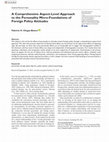
Personality and Social Psychology Bulletin, 2024
We analyze in this article the effects of personality on attitudes toward foreign policy through ... more We analyze in this article the effects of personality on attitudes toward foreign policy through a comprehensive aspect-level approach. We claim that previous observed null domain-level effects are the product of the aspect-level effects of opposing signs. By and large, we show that some personality effects are of comparable size or bigger than demographics studied in the literature, and that some of these effects are unique and independent of demographic covariates. Our results show that openness, orderliness, and compassion render people to be more supportive of cooperation. Assertiveness is the primary driver of support for the use of military force, whereas politeness and withdrawal ground reverse effects. Volatility roots isolationism postures, whereas industriousness, enthusiasm, and compassion show strong opposing effects. Moving beyond the Big Five personality domain approach provides us with a deeper and more nuanced understanding of how personality is associated with attitudes toward international issues.
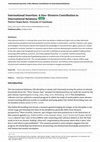
Oxford Research Encyclopedia of International Studies, 2023
International insertion is a concept that comes from non-Western intellectual origins and can hel... more International insertion is a concept that comes from non-Western intellectual origins and can help individuals understand how peripheral and semi-peripheral countries behave in world politics, and their interests, core values, and strategies. International insertion also expands the knowledge to characterize how agency spaces are created by peripheral countries. Insertion is a necessary step to those countries attempting to transition from the condition of one who seeks to be recognized as part of, to one who is admitted as possessing and capable of seeking status and acting within political, economic, and military global hierarchies. In a nutshell, insertion means being recognized by the small group of gatekeeping states as a relevant part of the specific social networks that constitute the global hierarchy. The conceptualization of international insertion allows a robust middle-range explanation that considers multiple dimensions (political, economic, and military) of the national and international structural and contextual aspects these actors must translate to navigate world politics.
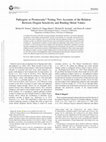
Emotion, 2024
A recurrent observation in the field of moral psychology is that disgust sensitivity is associate... more A recurrent observation in the field of moral psychology is that disgust sensitivity is associated with greater moralization of the binding (and particularly sanctity) moral domains. It is generally assumed that these effects are the result of disgust's role as an emotion that motivates pathogen avoidance (i.e., the pathogen avoidance account), yet alternative disgust-based accounts of moralization, namely those grounded in sexual avoidance (i.e., the promiscuity avoidance account), might also explain these observations. Across two studies (total N = 2,718), involving 10 diverse samples (from Australia, the United States, and Brazil), we found that after controlling for the shared variance of pathogen and sexual disgust, only measures of sexual disgust exhibited a positive (and strong) association with the binding moral foundations. These results argue against the pathogen avoidance account of disgust-binding effects and instead support the promiscuity avoidance account. Above all, this work highlights the utility of delineating the dimensionality of disgust to better characterize the different disgust-based motives underlying moral cognition.

Review of International Political Economy, 2023
Although IPE has become more reflexive over the last decade, Latin America's IPE thought has not ... more Although IPE has become more reflexive over the last decade, Latin America's IPE thought has not been seen as part of the disciplinary canon. In this article we investigate why and how mainstream IPE misrecognised, labelled as a misfit, and misperceived Latin American contributions to the discipline. We also examine and define the ontological and epistemological characteristics, and the evolving boundaries of IPE studied in Latin America. We argue that differently from the relative homogeneity that defines and has nurtured the 'Transatlantic divide', the diversity of expertise, backgrounds, and analytical approaches has founded and moulded the Latin American school of IPE. While treating Latin America's intellectual endeavours as an applicable ontology within IPE, we contribute to reframing narrow disciplinary approaches to knowledge coming from non-Western regions of the world. The notion of a Latin American school of IPE dispels the idea that regional contributions to the discipline may have been significant but remain in the past. To advance these global conversations, we must explore other IPE foundational myths and disciplinary origins beyond the disciplinary mainstream.

International Studies Perspectives, 2023
The International Studies Association (ISA) is widely recognized as an American-European-centric ... more The International Studies Association (ISA) is widely recognized as an American-European-centric professional organization, with Global South scholars traditionally representing a minority of its membership. This pattern largely reflects the development of the International Relations (IR) discipline and its publication trends. In this Forum, we examine the progress made in the representation of Global South scholars within the IR discipline over the past decade, specifically focusing on the ISA as the primary professional body for IR scholars. We tackle some issues the Global South Task Force (GSTF) highlighted to a more assertive representativeness of the Global South within the ISA. Our analysis concentrates on ISA's journals data tracking to capture the current state of affairs and foster dialogue on developing inventive solutions to enhance diversity, intellectual plurality, and scholarly cultures within the IR discipline. Rather than resorting to outright criticism, we adopt a constructive stance, discussing attempted solutions and proposing steps to advance the discipline.
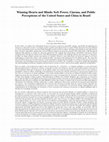
Global Studies Quarterly, 2023
In this article, we explore the relationship between soft power projection and public opinion, sp... more In this article, we explore the relationship between soft power projection and public opinion, specifically investigating how cinema as a soft power resource can shape people's positive perceptions about a country. While soft power has been defined as a form of persuasive power associated with intangible resources such as culture, ideology, and institutions, the link between these resources and public opinion has received limited attention in previous research. This study aims to fill this gap by using the film industry as a proxy for soft power projection. We compare the United States' and China's soft power sources and projections through an online survey with 908 participants in Brazil. Our findings indicate that exposure to soft power via films can shape people's positive perceptions of countries. However, some dimensions of soft power appear to be more challenging to activate than others, such as patriotic films' association with admiration for US military power. The study also discovered that soft power activation may be context dependent, with greater knowledge of a country's soft power resources in a particular context leading to increased soft power projection/activation. We contribute to research by empirically expanding our understanding of soft power dynamics and how power resources can be converted into public opinion in world politics.
Estudos Internacionais, 2022
Los últimos treinta años fueron definitivos para que se cuestionara el concepto clásico de seguri... more Los últimos treinta años fueron definitivos para que se cuestionara el concepto clásico de seguridad. En los 1990, teóricos en Copenhague, Aberystwyth y París trataron de ampliar el entendimiento sobre qué significa una amenaza, también sobre cómo se da el proceso de delimitación y definición de lo que se debe proteger en la política internacional-la securitización. En este artículo, con base en la historia de los conceptos, investigamos la genealogía de los dos conceptos comunes y centrales a las escuelas europeas de los estudios de seguridad, comparando y señalando sus similitudes y contrastes.
Revista da Escola Superior de Guerra, 2022
There is an implicit assumption that the cornerstone in the formulation of Brazil’s international... more There is an implicit assumption that the cornerstone in the formulation of Brazil’s international interests and priorities is the Itamaraty. Since the beginning of the Republic, however, the president has dictated the course of Brazilian foreign policy. So, why do the president’s capacities in relation to the priorities of his political agenda mobilize foreign policy? In this special issue that reflects on the place of Brazilian foreign policy in the Bicentennial of Independence, this article aims to analyze the individual decisions of the president within a long-term trajectory of Brazilian foreign policy. We argue that when the levels of engagement of the Presidency of the Republic are high, there is a real impact on how foreign policy is conducted.

Global Affairs, 2021
Led by the Armed Forces, the 1964 coup inaugurated a dark time in Brazil, with suspension of poli... more Led by the Armed Forces, the 1964 coup inaugurated a dark time in Brazil, with suspension of political rights, censorship, and human rights violations in the context of the Cold War. Although the 2011 National Truth Commission was able to produce a report on the human rights violations, it seems many Brazilians prefer to forget the years of lead. While the military regime remains a scar in Brazil's history, the 2018 election of Jair Bolsonaro, a retired Army Captain who had previously called the military regime a glorious period, has produced a cabinet mostly occupied by retired military officers who do not feel they should be apologetic towards the coup. The aim of this article is to highlight the dynamics of an ongoing mnemonic war over the very meaning of 1964 as a historical event of political rupture in Brazil, which points to the securitization of memory in Bolsonaro's regime.
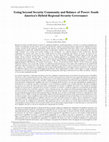
Global Studies Quarterly, 2021
Regional security in South America cannot be explained simply by considering balance of power or ... more Regional security in South America cannot be explained simply by considering balance of power or security-community governance mechanisms. In this article, we present and discuss a hybrid security-governance approach for talking about governance security in the Americas, particularly, South America. We hypothesize that there exists a new security-governance configuration in which the traditional governance mechanisms—balance of power and security community—are not mutually exclusive, but overlap and coexist, leading to the emergence of a regional hybrid security architecture. Beyond explaining the reasons and causes for the overlap between security community and balance of power, we show the hybrid nature of regional security governance and point out how taking the hybridity conceptual approach fills the gaps within current research. We first offer a critique of two leading approaches to thinking about security in the Americas (balancing and security communities). Next, we show how the overlapping configurations in South America's regional security governance happen, testing Adler and Greve's (2009, “When Security Community Meets Balance of Power: Overlapping Regional Mechanisms of Security Governance.” Review of International Studies 35[S1]: 59–84) framework against historical evidence. Last, we provide evidence of a hybrid security governance in the region. We complement our analysis with qualitative data from interviews with scholars, political, diplomatic, and military actors conducted in various countries across the region. Our contribution is a significant step toward understanding how security-governance formations come about in non-Western regions of the world, privileging its specificities. More importantly, we offer a novel angle to escape straitjacket hypotheses to security governance grounded in Western hegemonic ideal types, which have focus either on balance of power or on security-community models.

Economic and Political Studies, 2021
China's rapid economic growth created new challenges and opportunities for Latin America over the... more China's rapid economic growth created new challenges and opportunities for Latin America over the 2000s. Much ink has been spilt analysing how countries in the region surfed the Chinese wave of commodity-based prosperity. However, there is fertile and quite unexplored territory to analyse how these regional powers in the Global South, from a comparative perspective, have interacted with China as they tried to improve their international position over the 2000s. We analyse in this article how Brazil and Mexico dealt with China's presence and strategic goals in Latin America and assess the outcomes they extracted from this relationship. We draw evidence from and offer comparisons across different presidencies in each country (Lula and Rousseff in Brazil, and Fox, Calder on, and Peña Nieto in Mexico) over the 2000s, which allows us to grasp the variation in ideology, governance style, and electoral legitimacy. We ground our theoretical framework in the concept of international insertion, a Southern-based framework that opens space to understand and explain how countries in the South behave in international politics from a different point of view. We claim that the efforts made by the national governments in both countries to improve their positions achieved limited or transitory results, if considering China as a strategic factor.

Brazilian Journal of Latin American Studies, 2021
El gobierno colombiano y el grupo guerrillero de las FARC-EP (Fuerzas Armadas Revolucionarias de ... more El gobierno colombiano y el grupo guerrillero de las FARC-EP (Fuerzas Armadas Revolucionarias de Colombia-Ejército del Pueblo), después de más medio siglo de conflicto en el país, llegaron a un acuerdo de paz en 2016. El Acuerdo de Paz de La Habana, desde una perspectiva de paz positiva, trae más que un posible fin a la violencia a Colombia: aborda los desafíos a la protección social profundamente arraigados legados por el conflicto, además de una refundación del Estado colombiano. Hay una laguna teórica y empírica, todavía, sobre ¿por qué y cómo pueden los mecanismos de justicia transicional colaborar con la promoción de medidas de protección social y abordar sus desafíos en ambientes de construcción de paz? En este artículo argumentamos que la justicia de transición impulsada por el Acuerdo es una herramienta fundamental para hacer frente a los desafíos a la protección social en Colombia-sean ellos históricos u oriundos de la pandemia de COVID-19. Proponemos un nuevo ángulo a las perspectivas tradicionales de construcción de paz, justicia de transición, y estudios de protección social, mostrando que hay ganancias analíticas en una perspectiva interdisciplinaria que va hacia un punto intermedio entre los aspectos minimalistas y maximalistas de los estudios construcción de paz, y que incorpora los mecanismos de justicia de transición los desafíos sociales bajo un plan de desarrollo a largo plazo.

Latin American Politics and Society, 2019
Contending rationales of peace and conflict coexist between countries and within regional spaces ... more Contending rationales of peace and conflict coexist between countries and within regional spaces as conditions that motivate or constrain militarized behaviors. While the idea of balancing is still a relevant concept to understand contemporary security in South America, the region produces patterns of a nascent security community. This article argues that the regional repertoire of foreign and security policy practices draws on a hybrid security governance mechanism. The novelty brought by the cumulative interaction among South American countries is that the coexistence turns into a hybrid between both practices and discourses. To explain how hybrid formations are produced, this study analyzes the most empirically intense and academically controversial political and security interactions from interstate relations in the two security complexes in the region, the Southern Cone and the Northern Andes.
Revista de Estudios Sociales, 2019
One hundred days have passed since Bolsonaro took office, and there are two salient aspects of hi... more One hundred days have passed since Bolsonaro took office, and there are two salient aspects of his presidency: first, it is clear that he was not tailored for the position he holds; second, the lack of preparation of his entourage and the absence of parliamentary support has led the country to a permanent state of crisis. In this article, I make an initial assessment of a presidency that was the direct outcome of a pivotal election that fractured the Brazilian political landscape and catapulted an unknown Congressman to the highest political office in the republic. The first part of the article covers the 2018 elections as the critical juncture of the Nova República [New Republic]. The second part delves into the main events Jair Bolsonaro’s first three months in office.

Journal of Intercultural Studies, 2019
How can the postcolonial thought bring to light the development of International Political Thinki... more How can the postcolonial thought bring to light the development of International Political Thinking in India? In this article we argue that the development of the Indian thinking about foreign affairs was limited not only by the British colonial administration but also by the sense of nationhood created by the liberation movement – especially under Nehru. Most of the literature addressing Indian international thought focuses on how Nehru centred the thinking of postcolonial Indian foreign affairs. Using Bhabha’s ideas, we explore this essential part of India’s nation-building, mapping out the origins of Indian IR through a postcolonial perspective. The paper contributes to knowledge on post-Western IR and postcolonial literature, while reconceptualising ideas of nationhood as they have been applied to the development of Indian international thought. Beyond the thinking about the international, our contribution has broad relevance for understanding how colonialism has affected the political, economic and intellectual development of former colonial states.
E-International Relations, 2019
General Assembly, on the 24th of September, showed how he sees the world: with paranoid Cold War-... more General Assembly, on the 24th of September, showed how he sees the world: with paranoid Cold War-like lenses, lack of political sophistication, and a blind-folded alignment with Donald Trump's efforts to 'make America great again'. Earlier in September, for almost a week, Brazil stayed in the spotlight due to the fires threatening the Amazon forest, but mostly because of the presidential verbiage against France's Emmanuel Macron and other G7 leaders criticising Brazil's inaction to fight the wildfire. These were only the most recent disharmony episodes of an almost year tenure in office that is reinventing Brazilian foreign policy.

Rising Powers Quarterly, 2019
The beginning of the 2000s seemed promising to Brazil and Mexico. The combination of the outcomes... more The beginning of the 2000s seemed promising to Brazil and Mexico. The combination of the outcomes of years of domestic reforms with the commodity boom allowed the two biggest economies in Latin America to afford more ambitious international goals. A cruise flight turned into turbulence, and the frustration did not take long to come. By the end of the 2010s, both countries did not exhibit the same impetus for seeking international insertion and recognition as they had at the beginning of the decade. Drawing on evidence across the four presidents who occupied the Planalto and National Palaces between 2006 and 2018, this paper explores in a comparative historical perspective the ‘rising powers’ trajectories of Brazil and Mexico. We ground our argument on the concept of international insertion, couched on a Southern interpretation of international relations. We fill the gap upon the theorisation on how the transition from a peripheral position occurs and contribute to advance the understanding of how Southern countries seek new positions in global hierarchies and their international engagement —which the mainstream IR approaches do not adequately explain. By the end of the 2010s, both countries have only marginally reaped the gains of trying to act more assertively in the regional and global arenas.
Uploads
Journal Articles by Fabrício H . Chagas-Bastos